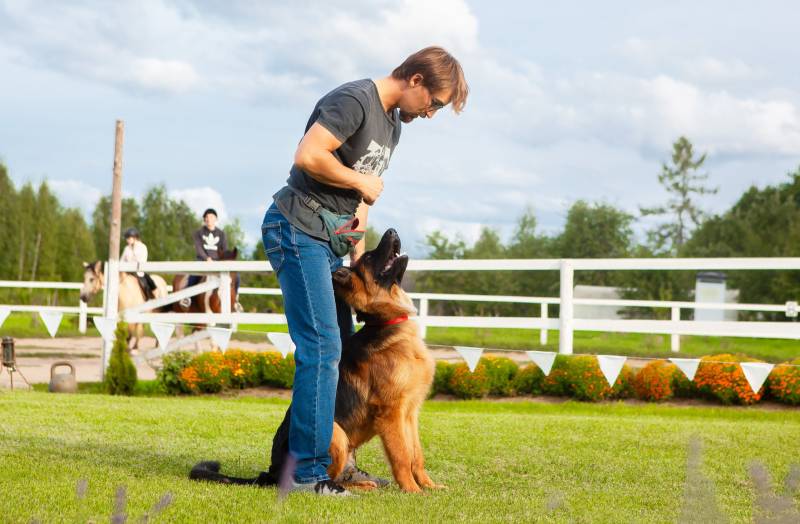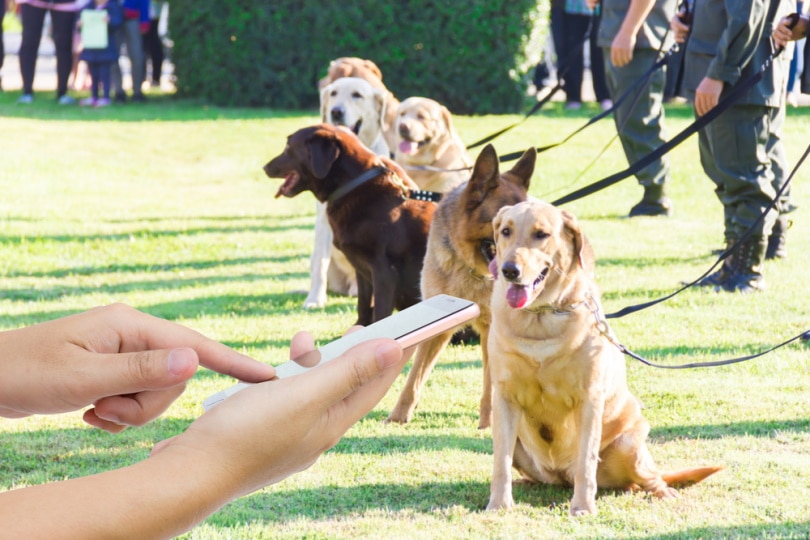Click to Skip Ahead
Dogs are incredibly popular pets, and most people consider them to be a part of the family. That said, your dog needs to be trained to ensure that they are well-behaved and obedient when you need them to be. However, training can be difficult, especially for new pet owners, and many wonder if they should do it themselves or hire a professional.
Keep reading as we discuss the pros and cons of each option to hopefully help you make an informed decision.
The following comparisons are for a relatively friendly, problem-free puppy that you’ve adopted. If your prospective pet has a history of behavior issues, it’s best to have a professional rehabilitate and retrain them properly.

If you need to speak with a vet but can’t get to one, head over to PangoVet. It’s an online service where you can talk to a vet online and get the personalized advice you need for your pet — all at an affordable price!
Pros of Training Your Dog Yourself
1. Doubles Down on Bonding
Training your dog yourself means you will have time for additional bonding as you train them, helping you build trust and deepen your relationship with your pet.
2. Budget Friendly
Training your dog yourself is much less expensive than hiring a professional, especially if you intend to teach your dog several commands.
3. Schedule Flexibility
Training your dog yourself means you get to set when and where to have your training sessions, and you won’t need to make any inconvenient trips to the trainer, who might be a long distance away. However, do keep in mind that many trainers may also offer services where they come to your residence to train your dog.
4. Rewarding
For many people, successfully training their pet dogs ends up being a rewarding experience.

Cons of Training Your Dog Yourself
1. Time-Consuming
Training a dog is time-consuming, especially if you are inexperienced or own a breed that can be more challenging to train, like a Bloodhound or a Dalmatian.
2. May Require Experience
If you don’t have much experience training dogs, you might not know the best methods, leading to frustration for you and your pet.
3. Inconsistent Training
When you train your dog at home instead of taking them to a scheduled appointment, it can be easy to miss training sessions or cut them short, leading to inconsistent training. This can cause your dog to lose focus or become disinterested in learning new commands and tricks.
This applies to you too; if you don’t focus during the training sessions, they might not be fruitful.

Pros of Hiring a Dog Trainer
1. Professional Expertise
The biggest advantage of hiring a professional trainer is the expertise that they bring to the table. They know the most effective methods to train different breeds and have the skills to deal with behavioral problems.
2. Time Savings
Hiring a professional trainer frees up your time, and since they have the skills to train many different breeds effectively, it usually takes less time to teach your pet a new trick.
3. Customized Training
Most professional trainers will work with you to address your pet’s needs, creating a plan that suits your pet’s personality and behavior.
4. Accountability
When you hire a professional trainer, they are accountable for the training, so you can be sure your pet will learn the necessary commands and behaviors. They will also provide support if issues with the training arise.

Cons of Hiring a Dog Trainer
1. Cost
Hiring a professional trainer can be expensive, especially if you have a hard-to-train breed or a dog with behavioral problems.
2. Limited Input
When you hire a professional trainer, you may not have as much control over their methods and techniques. You might not even be present at the training sessions, making it difficult to monitor your dog’s process from start to finish. However, this isn’t a major issue at all times; many trainers can accommodate your input—in fact, the best ones will often make it a point to do so.
3. Limited Control
When you hire a professional trainer, you don’t have any control over their methods and techniques. You might not even be present at the training sessions, making it difficult to monitor your dog’s process from start to finish.
4. Dependency
Some people hold the belief that if you use a professional trainer too often, you might become lazy and not attempt to train a dog yourself instead of learning valuable techniques to train future pets.
However, at times, it’s important to be honest with yourself. If you sincerely believe that it’s best for your dog to be trained by a professional, that may offer both you and your dog the best pet ownership experience possible in the long run.
Being overly harsh or self-critical about your input (or lack thereof) for training your dog isn’t necessarily a valid form of self-criticism. After all, you do contribute to other aspects of your pet’s life which also makes a huge difference in the long run.

 Tips for Training Your Dog
Tips for Training Your Dog
- Start with simple commands like “sit,” “stay,” “come,” and “heel,” as these will provide a foundation for more complex orders later.
- Use positive reinforcement, like treats, praise, and affection, to help create a trusting environment that is more conducive to learning. It will also help your pet look forward to their training sessions.
- Be consistent in holding your training sessions at the same time each day and using the same commands and techniques to help the dog get into a routine.
- You might want to start with short training sessions (approximately 15–30 minutes) as a starting point. You can increase the length later as your dog becomes more skilled.
- Be patient and never get frustrated with your pet, as learning a new command can take a long time, even for intelligent dog breeds.
Which Option Is Right for Me?
Whether you choose to train your pet or hire a professional depends on your situation. It can be a good idea to hire a professional trainer if you don’t have much experience training or your dog has a behavioral problem or is difficult to train.
However, training your dog yourself can be a great learning experience for both of you as well. Ultimately, your decision should come down to an honest assessment of yourself and your dog. If either of you needs the help of a professional, that should be the route you take.
Featured Image Credit: Peter Mayer 67, Shutterstock















